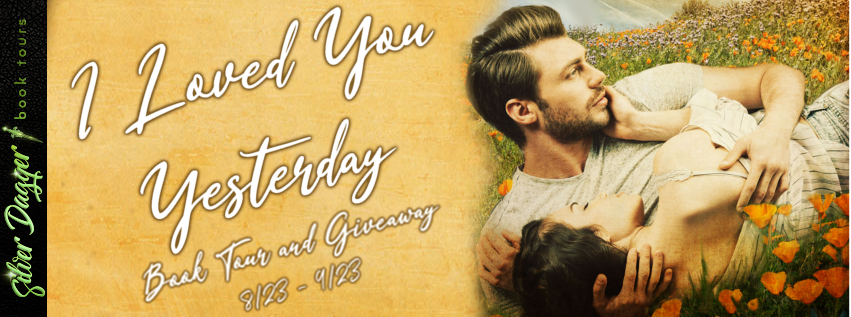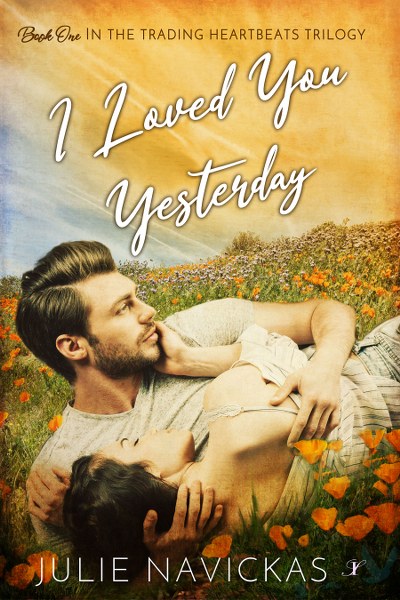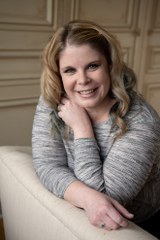
Author Interview!
What are your top 10 favorite books/authors?
The Lord of the Rings trilogy, J.R.R. Tolkien
Mr. Wrong Number, Lynn Painter
Good Omens, Terry Pratchett & Neil Gaiman
The Harry Potter Series, J.K. Rowling
Top Ten, Katie Cotugno
The Night Huntress Series, Jeannine Frost
Blame it on Paris, Laura Florand
The Canary Song, Natalie Banks
The Dream Series, Nora Roberts
The Trouble With Wings, Jillian Bright
What book do you think everyone should read?
If you haven’t read The Lord of the Rings, I don’t know what you’re doing with your life
Do the characters all come to you at the same time or do some of them come to you as you write?
Main characters typically take shape in my brain around the same time, but I have been very surprised at the secondary characters who grow and transform—and hijack the story along the way!
Do you see writing as a career?
In a way, writing is my career. I teach coursework in the School of Communication at Illinois State University and as the part-time impact manager with Burning Soul Press, I write everyday with a strategic, audience driven lens.
But… if we’re talking fiction writing as a career, I would jump on that train with no ticket and take my chances! Talk about DREAMS!
What do you think about the current publishing market?
I think it’s absolutely brilliant. The self-publishing world has exploded, and authors can now share their stories with the world without having an agent or publisher. The gatekeepers have been eliminated, and simply put, it allows for more stories to be shared with the world. Similarly, platforms like TikTok offer authors an incredible avenue to market their books to readers. Opportunities are available today like never before and I fully appreciate the alternatives to traditional publishing.
Do you read yourself and if so, what is your favorite genre?
I spend so much time writing it’s difficult to avidly read. But when I sneak a book in, I always choose contemporary romance or high fantasy.
Do you prefer to write in silence or with noise? Why?
If the room I’m in is not silence, I can’t be productive. White noise is my preference!
Do you write one book at a time, or do you have several going at a time?
Typically, I’m only actively writing one book at a time, but that doesn’t mean my wheels are not turning! I often find myself plotting out my next book while writing my current!
Do you have any advice to offer for new authors?
Yes, I do. My advice is simply… just try. Had it not been for the solitude of the pandemic, I do not think I ever would have embarked on this journey. Whatever motivation you need—or whatever life throws your way, take it, and don’t look back. Writing is difficult, but I’ve found it to be one of the most fulfilling avenues to express my creativity and emotions.
Build up to it. Write a story that’s just for you. And when you’re ready to remove the training wheels, write a story for your ideal reader (which should still be you!). Find the power and tap into it. But no matter what, do not stop trying. Every story has a place in the world.
Describe your writing style.
I’m going to answer this question with a story. When I first drafted, I Loved You Yesterday, I submitted my manuscript to several agents and publishers. Some immediately turned me down and some wanted to know more. One publisher in particular requested my full manuscript. And within three days I received the longest email of my life. Ultimately, they passed on my work, but gave me an incredible amount of constructive feedback (which is unheard of!). In that moment, I was absolutely crushed. But looking back, I realize now that she gave me the most valuable piece of writing advice that has impacted every single word I’ve written since that day.
In that first draft, I focused on the play-by-play, narrating ever character’s action and movement. Simply put, it’s boring for the reader. The more interesting part to storytelling is feeling and emotion. That’s where character development comes in and relationships complicate. Think about it. Would you rather read about a character’s journey to the kitchen to get a bottle of water? Or would you rather learn about their need to satisfy their thirst and why they’re parched in the first place? Oftentimes there’s a metaphor at play that drives the action.
So, thanks to the She Who Must Not Be Named publisher, I now focus my writing on emotions rather than actions. And it has served me well!
What is your writing process? For instance, do you do an outline first? Do you do the chapters first?
The first thing I do is bust out Gwen Hayes’s Romancing the Beat book. Using Gwen’s 4-act structure, I plot out my entire story and tack color coded notecards to a corkboard. This gives me the visual space to “see” my full story before I type a single word. After that, I just start and follow the plot points sequentially until I have a first draft!
What are common traps for aspiring writers?
I wrote a blog post on this exact topic because I wanted to share the top five mistakes I made as a new writer!
Passive Voice. The word “was” is simply dismal – and it has absolutely no place in (good) storytelling. I teach coursework in journalism at Illinois State University and this piece of writing advice is one of the first things I say to every new student in my classroom. When you use the word “was”, you’re tell-ing a reader what’s happening, not showing them (hang tight – more on this below!). Passive words take the reader out of the story. So, for example, if I wrote, “She was standing by the bed,” my advice would be to challenge the tense. Rewrite the sentence to read, “She stood by the bed.” It’s active – it’s less words – and it allows the reader to be in the moment instead of reliving it. Active writing is better writing.
Dialogue Tags. You do not need a dialogue tag every time you write a piece of dialogue. Generally, a reader can infer who is speaking based on the flow of conversation. Only include a dialogue tag if it’s unclear who the speaker is. Similarly, keep the creativity out of the tagging. Nine times out of ten, “she said”, is your best option. I cringe when I see authors try and vary their tags – oftentimes using tags that do not make sense. I read one last week similar to “XYZ,” she breathed. Breathing and speaking are not the same thing. Only use dialogue tags when they’re warranted – and cut the creativity.
Show, Don’t Tell. If you use the words “felt”, “realized”, or “was” in your manuscript – you’re telling the reader – not showing. Challenge your skillet to describe the feelings or emotions that come with these words. Instead of saying, “Michael felt scared”, describe what scared feels like. Describe the hairs on the back of his neck – or the chills that race up and down his spine. Don’t tell the reader – show them instead! Draw on your five senses to really dig deep. This comes with a tremendous amount of patience and practice, but you can’t give up. It’s the secret to good storytelling.
Limit Adverbs. As a general rule, I allow myself three adverbs per book. Each book that I’ve written in the Trading Heartbeats trilogy is roughly 75,000 words. So, in 225,000 words, I used just nine ad-verbs. Adverbs weaken writing. Take it from Stephen King. In his memoir, On Writing, he dedicates a full chapter to this piece of advice, famously quoting, “I believe the road to hell is paved with adverbs, and I will shout it from the rooftops. To put it another way, they’re like dandelions. If you have one on your lawn, it looks pretty and unique. If you fail to root it out, however, you find five the next day… fifty the day after that… and then, my brothers and sisters, your lawn is totally, completely, and profli-gately covered with dandelions. By then you see them for the weeds they really are, but by then it’s – GASP!! – too late.” Limit your adverbs and you strengthen your writing.
Ditch the Play-by-Play. The first time an agent requested a full manuscript after a query, I received at least twenty pages of notes. This agent laid into me. But through the tears reading through her com-ments, I saw a really poignant piece of advice. Ditch the play-by-play. If a character is thirsty and needs a glass of water, just say it. The reader doesn’t need to know that he tiptoed across the creaky floor and gently grasped the handle of the refrigerator, pulling from the top shelf a cold bottle of water. Rather – describe what thirst feels like – the parched, scratchy throat, aching for a cold trickle of water to coat the tongue. Ditch the play-by-play and focus on feelings – and emotions. You’ll build stronger characters, relationships, and connections with your readers.
How long on average does it take you to write a book?
I take about six months to really feel good about a first draft!
Do you believe in writer’s block?
I believe in types of writer’s block. Let me explain that! If I’m struggling with a scene in my fiction novel and the ideas and words just are not coming, I step away. But I do not step away from writing. As an author there are million other things that I can be doing that involve the skillset: social media, a new blog post, my next newsletter, a book blurb, a character profile, an interview questionnaire for a feature, website updates, etc.
While a type of writing may pose a problem, I can typically solve that block by allowing my brain to focus on something else writing based.
Secrets always have a way of coming out.
Mavis Benson made a huge mistake. Scratch that--colossal mistake. Twice. Sleeping with her high school sweetheart’s twin brother definitely wasn’t part of the plan… nor was falling in love with him.
But that wasn’t the only complication Mavis faced. When an unplanned pregnancy upends her life at seventeen, Mavis skips town to spare her boyfriend, Josh Templeton, from the fallout. With only a letter of apology, she disappears, but not before confiding her secret to Josh’s brother, Austin.
When Austin resurfaces in her life years later, he brings the past to Mavis’s doorstep. Josh wants her back, Austin isn’t willing to surrender, and the path to happiness isn’t clear. Caught between both men, Mavis must choose between the brother for whom she broke her own heart, and the brother who picked up the pieces.

Check it out on Goodreads!
Buy your copy from Amazon, Barnes and Noble, Kobo or Apple Books

Julie Navickas is an award-winning, nationally recognized contemporary romance novelist, known for her keen ability to tell heart-wrenching, second-chance love stories through relatable characters with humility, humor, and heroism. She is also an award-winning university instructor and serves as the executive director of The Writing Champions Project. Julie earned master’s degrees in both organizational communication and English studies with an emphasis in book history, as well as a bachelor’s degree in public relations, graduating cum laude from Illinois State University.




No comments:
Post a Comment